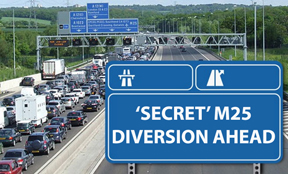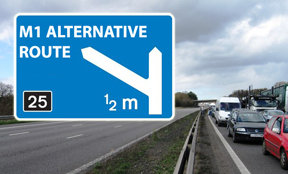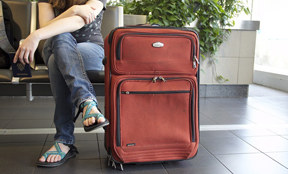
Drivers from the UK heading to France could find they are hit with more speeding tickets after new ‘super-precise’ speed cameras, the Nano Parifex, have been introduced.
Here is all you need to know about the new speed cameras when driving on French roads.
 New speed cameras are coming to French
roads - here are the details (Credit: European
Roads/Flikr)
New speed cameras are coming to French
roads - here are the details (Credit: European
Roads/Flikr)
What is the Nano Parifex speed camera in France?
The Nano Parifex is put on the top of existing camera and has 360-degree scanning capabilities that can record and analyse a driver’s speed to higher levels of accuracy.
Will it mean more fines for British drivers in France?
It could mean more fines for British and French drivers, because it is so accurate the margin for error is removed. Currently it is reported that 5km/h is deducted from recorded speed before a fine is issued to account for the margin of error on existing cameras.
This reduction in recorded speed will potentially no longer be required due to the super-precise nature of the new cameras – potentially meaning more fines for all drivers in France.
Do the cameras work like the current ones over a small distance?
The new speed cameras can operate over a much longer distance – rather than the fixed point that current cameras record a driver’s speed over. This could also result in more drivers being issued with penalties.
Is it just used as a speed camera?
The Nano Parifex can also spot other driving infringements, such as crossing continuous white lines and ignoring stopping distances.
However, the cameras have yet to be employed for such offences – but it is reported that this could soon happen.
How does the Nano Parifex speed camera work?
It is claimed that the Nano is almost 100% accurate. It uses laser-sweeping to model in 3D trajectory and speed of cars over more than 100m, with mathematics analysing the average speed over the distance.
The camera's manufacturer lists the Nano Parifex's benefits and key features as follow:
- Detects all static and moving objects (pedestrians, cyclists, vehicles…)
- Simultaneous discrimination of multiple targets
- Vehicle profiling (dimensions, distance, speed, etc…)
- Large field of view (up to 360°)
- Rapid data acquisition time
- Resistant to any extreme weather conditions
- Immunity to lighting variations (during daytime and at night).
- Light and compact
- One single sensor for multiple enforcement
What do French motoring organisations say about the new cameras?
The drivers’ organisation 40 Millions d’automobilistes spokesman Pierre Chasseray said: “This is the symbol of a zero tolerance policy from the government.
“I fear that this high-precision speed radar could increase the number of non-dangerous speed tickets with an excess from 1-5km/h.”
He also said that 50% of tickets were issued in that range, so without the 5km/h reduction for margin of error, there is likely to be a large increase in speeding tickets issued.
Do French speed cameras flash?
Most of them will flash if they are static cameras - including the new Nano Parifex speed camera. However, mobile speed cameras used by the French police will not flash. The same if true for the new fleet of private speed camera cars that are fanning out across France.
Will the number of speed cameras increase in France?
As of 1 January, 2021, there were 4,224 speed cameras in France, according to the ticket-issuing agency. However, the operational status of speed cameras in France has fluctuated over time.
In 2019, many cameras were vandalized during the "Yellow Vests" protests, leaving a significant number non-functional. However, by 2023, around 99% of the estimated 4,700 cameras were reported to be back in operation.
The French authorities are also increasing the use of mobile, invisible cameras used in police cars and by other private operators.
Are there average speed cameras in France?
Yes, radars tronçons, check average speed between two points over several kilometres, so cannot be avoided by braking when a camera comes in sight, are another recent addition. These are the same as average speed cameras found during roadworks and as permanent cameras on motorways such as the M25.
Do I even have to pay a speeding fine from France?
If driving a hire car and the fine was issued through being caught on camera and not stopped at the side of the road, the fine will likely be sent to the hire car firm, which will take the money off your credit card – and in many cases add an admin charge at the same time.
If in your own car, you are unlikely to receive a fine – but this is not ruled out – due to post-Brexit agreements not being completed. France is, however, keen to forge a deal where details are shared – in a similar agreement it has with non-Eu country Switzerland.
Driving in France checklist for UK drivers
Here's a quick checklist for UK drivers planning to drive in France
| Item | Required? | Notes |
|---|---|---|
| Full UK Driving Licence | ✅ Yes | Both paper and photocard if applicable |
| Vehicle V5C logbook or VE103 | ✅ Yes | Proof of ownership – more on VE103 |
| Valid Insurance (with EU cover) | ✅ Yes | Check with your provider for confirmation |
| Passport | ✅ Yes | Must be valid for at least 3 months after return |
| Travel Insurance | 🔲 Advised | Helps cover unexpected medical or trip issues |
| MOT certificate | ✅ Yes | For vehicles over 3 years old – check your renewal date |
| Reflective jackets (one per occupant) | ✅ Yes | Must be within reach (not in the boot) |
| Warning triangle | ✅ Yes | Legally required |
| Headlight beam deflectors | ✅ Yes | Required even for LED lights |
| UK sticker/identifier | ✅ Yes | Needed unless UK plates have Union Jack |
| Spare bulb kit | 🔲 Advised | Not a legal requirement but useful |
| Breathalyser kit | 🔲 Advised | Not enforced, but still recommended |
| Sat nav without speed camera alerts | ✅ Yes | Disable alerts for camera locations |
| Credit/debit card or cash for tolls | ✅ Yes | Many motorways are tolled |
| Emission sticker (Crit’Air) | 🔲 Sometimes | See more on Crit'Air here |
| Drive on the right-hand side | ✅ Yes | Pay extra attention at roundabouts |
| Speed limits adjust in wet weather | ✅ Yes | Limits drop – always check signs |
| Drink and drug driving rules | ✅ Yes | Strict rules apply |
| No use of hands-free earpieces/headphones | ✅ Yes | Illegal to use in France |
| European Breakdown Cover | 🔲 Advised | Very useful if you break down abroad |
| Paper map or offline GPS | 🔲 Advised | Helpful in rural areas with poor signal |
| EHIC/GHIC card | 🔲 Advised | Free or reduced-cost state medical care in EU |
Most read travel content
Take a look at more of our top travel-related news and guides here...
-
Do I need six or three months on my passport for Spain, France and other EU countries?
-
Do I need an International driving permit for France, Spain and other EU countries?
-
Who can sign my passport photo... can teaching assistants sign for kids?
-
Do I need a new passport now I have put on weight, dyed hair, gone bald etc?
-
How much do passports cost now we've left the EU?
-
Can my child or other adult fly with chicken pox - what the airlines say
-
Can I change a name on a plane ticket and how much will it be?
-
How much are fast-track security lanes at UK airports and how to book them
-
Can I fly with a broken leg or other bone?
-
How much are extra legroom seats on your flight - revealed here
-
Where can I charge an electric car at UK airports?
-
Are there any free drop-off points at UK airports?
-
What airlines have defibrillators on their planes
-
What does SSSS on your boarding card mean and should you be worried?
-
What help is there for travellers with autism at UK airports?
-
Do I need a V103 certificate to drive my car abroad?
-
Do I need to get a new passport if I move home?
Subscribe for free motoring and travel news











